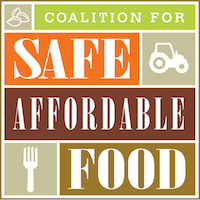 The Coalition for Safe Affordable Food, organized a fly-in bringing representatives of our country’s agriculture and food sectors to Capitol Hill urging passage by Congress of a uniform, national labeling standard for foods made with genetically modified organisms (GMOs).
The Coalition for Safe Affordable Food, organized a fly-in bringing representatives of our country’s agriculture and food sectors to Capitol Hill urging passage by Congress of a uniform, national labeling standard for foods made with genetically modified organisms (GMOs).
Vermont is set to implement its own labeling standard next July and other states passing or considering their own labeling mandates, participants in the fly-in expressed the urgency to get a federal bill passed this fall in order to stave off the negative effects of a patchwork of differing state labeling laws.
A uniform, national food labeling standard will ensure that consumers in all 50 states have access to the same labeling information, bringing consistency and transparency to the marketplace. Additionally, a GMO-free certification program will provide consumers who choose to purchase non-GMO items a reliable means of doing so.
The group came from 22 states who represent the entirety of the nation’s food supply chain: farming groups, co-ops, seed producers and food companies. In total, the group had more than 140 meetings on Capitol Hill Wednesday.
Participants in the fly-in expressed the urgent need for action by the Senate soon on the critical issue.
“Soybeans are a two-billion-dollar industry in Missouri and different state GMO labeling mandates would hurt hardworking farmers across that state,” said the executive director of the Missouri Soybean Association, Gary Wheeler. “As I explained to members of the U.S. Senate on Wednesday, inconsistent state labels would wreak havoc on Missouri farms. We need Congress to pass a reasonable solution that provides transparency and consistency for farmers and consumers.”
The U.S. House of Representatives passed the Safe and Accurate Food Labeling Act in July by a significant 275-150 bipartisan vote, with 45 Democrats voting yes. That legislation would ensure that consumers have access to the same science-based information regardless of which state they shop in instead of different state mandates. It would also create a national GMO-free certification program that would provide consumers who prefer GMO-free foods a consistent means of identifying those products.
